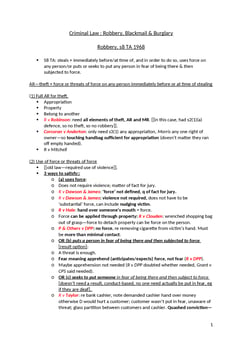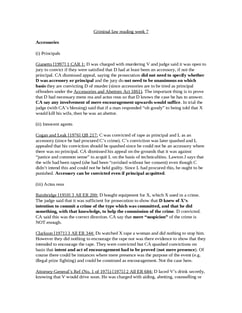R v Morris (David); Anderton v Burnside [1984] AC 320; [1983] 3 WLR 697; [1983] 3 All ER 288
Judgement for the case R v Morris (David); Anderton v Burnside
Table Of Contents
KEY POINTS
The concept of crime, particularly theft, encompasses various elements, one of which involves dishonest appropriation. In the context of a self-service store, a specific form of theft occurs when a customer engages in the act of switching price labels to cheaper items than the originals.
The determination of whether such an act constitutes "appropriation" hinges on the understanding of assuming the rights of the owner. This legal consideration is guided by the Theft Act of 1968 (c. 60), specifically outlined in sections 1(1), 3(1), and 15(1).
-
The essence of theft, as outlined in the Theft Act 1968 (c. 60), extends beyond mere physical taking and includes the crucial aspect of dishonest appropriation.
Within the confines of a self-service store, a distinctive scenario emerges when a customer deliberately alters price labels, substituting them with those from less expensive items to deceive the system.
-
The legal threshold for "appropriation" is met when an individual assumes the rights of the owner, thereby committing an act of theft.
These principles are detailed in sections 1(1), 3(1), and 15(1) of the aforementioned Theft Act.
FACTS
Under Section 1(1) of the Theft Act 1968, theft occurs when someone dishonestly appropriates another's property to deprive them of it permanently.
Section 3(1) defines any assumption of an owner's rights as appropriation, and Section 15(1) stipulates imprisonment for dishonestly obtaining property through deception.
-
The conjoined cases regard:
In the first case (Anderton v Burnside), a supermarket customer switched price labels on pork joints, leading to a theft conviction upheld by the Divisional Court.
In the second case (R v Morris), a Defendant replaced labels on supermarket goods paid lower prices and was convicted of theft in the Crown Court.
An appeal against conviction was dismissed by the Court of Appeal (Criminal Division).
JUDGEMENT
The appeals were dismissed.
In construing sections 1(1) and 3(1) of the Theft Act 1968, it was held that for the prosecution to establish appropriation, it was sufficient to prove the James Burnside (“Defendant's”) assumption of any rights of the owner of the goods.
The concept of appropriation involved adverse interference with or usurpation of, the owner's rights, which could be evidenced by one or a combination of acts, whether overt or not.
-
The precise moment of appropriation they were varied based on the circumstances.
In this case, the Defendants, by removing the goods from the shelves and switching labels, interfered with or usurped the owners' rights to ensure proper pricing and sale.
The order of these acts was immaterial.
Such actions constituted an appropriation under section 1(1) of the Act of 1968, and the Defendants were rightly convicted.
COMMENTARY
This case emphasizes theft, particularly dishonest appropriation in self-service stores, with a focus on altering price labels. The legal framework under the Theft Act of 1968 (sections 1(1), 3(1), and 15(1)) determines the criminality of such acts.
Theft, beyond mere physical taking, involves deceptive appropriation. The case illustrates instances leading to theft convictions under Section 1(1).
The judgment clarifies that proving the Defendant's assumption of the owner's rights establishes appropriation.
The order of actions is deemed immaterial, and the Defendants were rightly convicted.
For Further Study on R v Morris (David); Anderton v Burnside

A collection of the best GDL notes the director of Oxbridge Notes (an O...
Need instant answers? Our AI exam tutor is here to help.
Ask questions 🙋 Get answers 📔 It's simple 👁️👄👁️
Our AI is educated by the highest scoring students across all subjects and schools. Join hundreds of your peers today.
Get StartedSimilar Cases
Related Product Samples
These product samples contain the same concepts we cover in this case.
| GDL Criminal Law | Theft Notes (4 pages) |
| GDL Criminal Law | Theft Notes (7 pages) |
| Criminal Law | Theft Notes (21 pages) |
| GDL Criminal Law | Theft Related Offences Notes (11 pages) |

 Since 2010, Oxbridge Notes has been a trusted education marketplace, supplying high-quality materials from top achievers at universities like Oxford, Cambridge, LSE, Harvard, and Yale.
Since 2010, Oxbridge Notes has been a trusted education marketplace, supplying high-quality materials from top achievers at universities like Oxford, Cambridge, LSE, Harvard, and Yale.